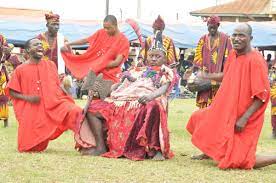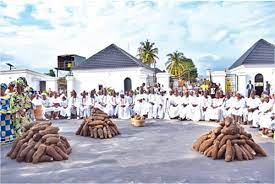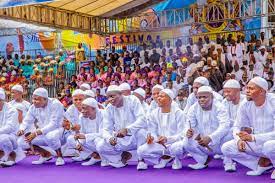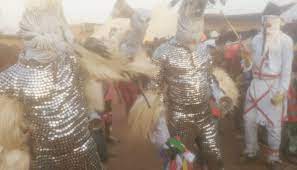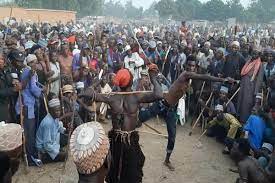
The Sharo Festival is a traditional festival celebrated by the Fulani people of Northern Nigeria. The festival involves a test of young man's courage and strength, where they are flogged and must prove their ability to withstand the pain. It is an ancient tradition that has been practiced by the Fulani for centuries and is still held today with great respect and reverence.
In this blog post, we'll look at the history and purpose of the Sharo Festival, its cultural importance, and the practices that make up the ritual.
The Origins of Sharo Festival
Sharo Festival has been a traditional festival of the Fulani people for generations. Its origins can be traced back to the ancient traditions of the Fulani's, where a young man had to prove his manhood by undergoing certain trials and tests. One of these trials involved being flogged in public as a sign of courage and resilience.
It was believed that this display of bravery would earn the young man the respect of his peers and demonstrate his readiness for the responsibilities of adulthood.
Over time, the flogging ritual evolved into a full-blown festival known as Sharo. The festival became an opportunity for the Fulani people to showcase their culture and traditions, as well as to come together in celebration and unity.
Despite the challenges of modernization and cultural change, the Sharo Festival has continued to thrive and remains an important part of the Fulani's cultural heritage. It is a reminder of the ancient traditions that have shaped the Fulani's way of life and continues to be a source of pride for this community.
The Significance of Sharo Festival
The Sharo Festival holds great significance within the Fulani culture. It is a time when young men are tested to prove their manhood and readiness for marriage. The festival is seen as a rite of passage, a way for young men to transition into adulthood and gain the respect of their community.
The significance of Sharo Festival lies in its ability to showcase the bravery, endurance, and resilience of the participants. The young men willingly submit themselves to floggings, enduring pain without flinching or showing any sign of weakness. This displays their courage and determination, proving that they are capable of protecting and providing for their future families.
The festival also serves as a platform for social interaction and networking among the Fulani community. It brings people together from different villages, fostering a sense of unity and solidarity. It is a time for exchanging stories, showcasing cultural traditions, and strengthening bonds between families and clans.
Furthermore, Sharo Festival is a way to preserve and celebrate the rich cultural heritage of the Fulani people. It serves as a reminder of their ancestral traditions, ensuring that they are passed down through generations. The festival also provides an opportunity for the younger generation to learn about their cultural roots and gain a deeper understanding of their identity.
Overall, the significance of Sharo Festival goes beyond just a mere test of manhood. It is a celebration of bravery, unity, and cultural heritage, playing a vital role in shaping the identity of the Fulani community.
The Rituals and Traditions of Sharo Festival
The Sharo Festival is rich in rituals and traditions that have been passed down through generations among the Fulani people. The festival begins with the selection of the young men who will participate in the flogging ceremony, known as "shadi". These young men, usually between the ages of 18 and 25, are chosen based on their physical strength and ability to endure pain.
Before the flogging ceremony takes place, the young men undergo a series of rituals and preparations. They are required to abstain from eating and drinking for several days, as a means of purifying themselves and demonstrating their dedication to the festival. They also partake in traditional dances and music, further enhancing the festive atmosphere.
On the day of the ceremony, the young men are adorned in traditional attire and gather in a designated area. The flogging is carried out by an older, more experienced member of the community, known as the "sarkin banza". The sarkin banza uses a specially crafted whip made from the hide of a cow or camel to administer the floggings.
During the flogging, the young men are expected to show no signs of pain or distress. They must maintain a stoic and composed demeanor, as any display of weakness is seen as a failure of their manhood. This aspect of the festival is meant to test their endurance, resilience, and ability to withstand physical pain.
Despite the intense nature of the flogging, the Sharo Festival is not intended to cause harm or injury to the participants. It is rather seen as a rite of passage and a demonstration of courage and strength. The rituals and traditions associated with the festival hold great significance in the Fulani culture, and they continue to be cherished and celebrated as a symbol of manhood and community unity.
Festivities and Celebrations during Sharo Festival
During the Sharo Festival, the festivities and celebrations are vibrant and lively, showcasing the cultural richness of the Fulani people. The festival usually lasts for several days, with each day filled with various activities and rituals.
One of the main highlights of the festivities is the traditional flogging ceremony, where young men gather to prove their bravery and endurance. The participants line up and take turns being flogged by the strongest and most experienced men in the community. The flogging is done with long and heavy wooden sticks, and the participants are expected to show no signs of pain or discomfort.
In addition to the flogging ceremony, there are also traditional dances, music performances, and horse riding competitions during the Sharo Festival. The Fulani people adorn themselves in vibrant and colorful traditional attire, creating a visually stunning atmosphere. Traditional foods and drinks are also served, allowing visitors to savor the unique flavors of Fulani cuisine.
The celebrations are not only limited to the young men undergoing the flogging ceremony but also involve the entire community. Friends and family gather to witness and support their loved ones, creating a sense of unity and camaraderie.
Overall, the festivities and celebrations during the Sharo Festival are a vibrant and spirited affair, showcasing the strength, resilience, and cultural heritage of the Fulani people. It is a time for the community to come together, celebrate their traditions, and honor their young men as they undergo the test of manhood.
Cultural Impact and Preservation of Sharo Festival
Sharo Festival is not only significant to the Fulani community, but it also plays a vital role in preserving their cultural heritage. This festival serves as an opportunity for the younger generation to learn and appreciate their traditions, beliefs, and values. Through the celebrations and rituals of Sharo Festival, the Fulani people demonstrate their respect for their ancestors and the role they played in their community.
Furthermore, the cultural impact of Sharo Festival extends beyond the Fulani community, as it draws attention and curiosity from visitors and tourists who come to witness this unique and vibrant festival. By embracing and showcasing their cultural practices, the Fulani people are preserving their heritage and ensuring that it continues to thrive for future generations.

















